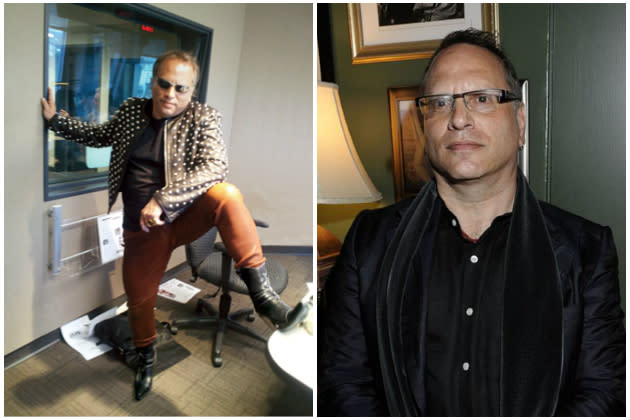 The Lookout
The Lookout‘Friday Night Lights’ writer Buzz Bissinger reveals stunning shopping addiction, questions sexuality

$638,412.97.
That's how much Buzz Bissinger, the 58-year-old best-selling author of "Friday Night Lights," says he's spent on designer clothes the last three years.
In a 6,000-word essay published in next month's GQ magazine, Bissinger reveals a crippling shopping addiction that he says is similar to doing drugs or having sex.
“I own eighty-one leather jackets, seventy-five pairs of boots, forty-one pairs of leather pants, thirty-two pairs of haute couture jeans, ten evening jackets, and 115 pairs of leather gloves," Bissinger writes. "I have an addiction. It isn't drugs or gambling: I get to keep what I use after I use it. But there are similarities: the futile feeding of the bottomless beast and the unavoidable psychological implications, the immediate hit of the new that feels like an orgasm and the inevitable coming-down."
Bissinger says the most expensive leather jacket he owns, a Gucci ostrich skin, cost $13,900. "The most expensive evening jacket I own, also from Gucci, black napa leather with gold threading, cost $9,800," he writes. "The most expensive leather pants, $5,600. The most expensive jeans, $2,500. The most expensive pair of boots, $2,600. The most expensive pair of gloves, $1,015.”
And Bissinger doesn't distinguish between buying men's and women's clothes:
Some of the clothing is men's. Some is women's. I make no distinction. Men's fashion is catching up, with high-end retailers such as Gucci and Burberry and Versace finally honoring us. But women's fashion is still infinitely more interesting and has an unfair monopoly on feeling sexy, and if the clothing you wear makes you feel the way you want to feel, liberated and alive, then f---ing wear it. The opposite, to repress yourself as I did for the first fifty-five years of my life, is the worst price of all to pay.
The Philadelphia-based writer admits the addiction has made him question his sexual orientation:
Was I homosexual because so much of what I wore is associated with gays? I did experiment. And while I don’t think it is my sexual being, I can tell you that gay men as a group are nicer, smarter, have a s---load more fun than straight whites. Was I veering toward becoming a dominant leather master in the S&M scene, the leather fetish an obvious influence in most of the clothing I purchased and in much of high fashion itself? I did experiment. Was I a closeted or maybe not so closeted transvestite? Tom Ford makeup is divine; the right foundation and cheek blush and eyeliner and lipstick can do wonders for the pallid complexion. Thigh-high boots add to any wardrobe, although walking on six-inch stilettos for hours is just a bitch and therefore confined to the privacy of my house, seen only by the UPS man, who at this point could not possibly be surprised by anything. But a dress or skirt just doesn’t look good on me, and I can’t ever do a thing with my hair. The look I was going for was more David Bowie androgynous. It wasn’t successful.
Bissinger also wonders if his addiction is simply the result of extreme narcissism coupled with money from a successful writing career. "I love looking at myself in the mirror when I buy something new. I love the sexual rush to the degree that I wonder if it has become a replacement for actual sex," he writes. "But just like [sex] the magic of new clothing wears off quickly, and you can’t resist the cravings for new purchases.”

And like any addict, Bissinger rationalized his addiction:
I wasn't mainlining heroin, just impossibly gorgeous leather jackets and coats and boots and gloves and evening jackets. I wasn't harming myself or anyone else. I was spending enormous amounts of money, but because I make a good living and received a generous inheritance from my parents, there was no threat of going broke. My wife and children never lacked for anything. Plus, I was a person of enormous willpower, and over and over I told myself that I could stop anytime I wanted. More delusion.
So what exactly triggered all of this?
"If there was a precipitating event for drastic change, it took place in the late summer and fall of 2009 with the departure of two of the most precious people in my life," Bissinger writes. "My wife, Lisa, left to take a job as an administrator at New York University Abu Dhabi. My youngest son went off to Kenyon [College]. I no longer felt like much of a husband; the 7,000-mile distance from Philadelphia to the United Arab Emirates hardly lent itself to weekend pop-ins. I also lost the one element of my life that had always sustained me and been constant, the raising of my three children. I felt alone. I was alone.”
In a separate statement, Bissinger said he has entered rehab and hopes his essay helps other shopaholics come to terms with their addiction.

